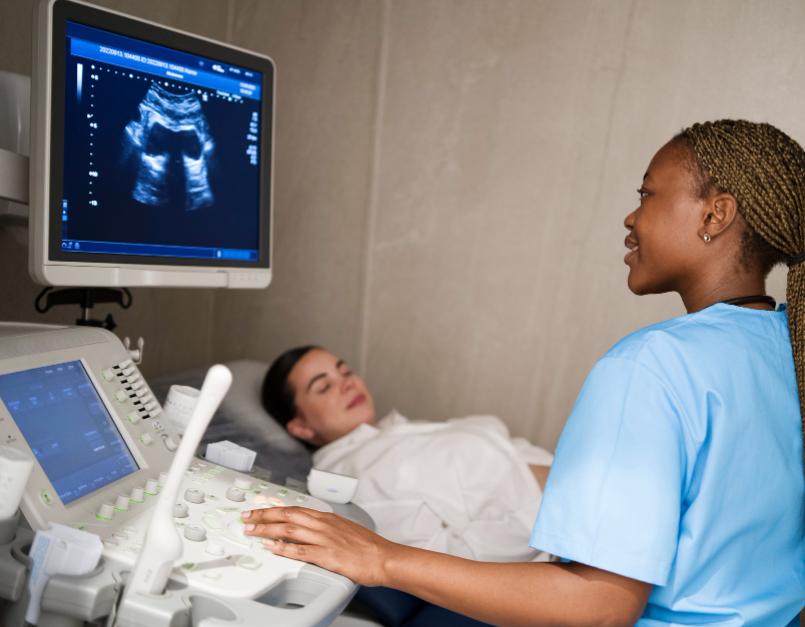Occupation Description The diagnostic medical sonographer provides patient services using medical ultrasound (high-frequency sound waves that produce images of internal structures). Working under the supervision of a physician responsible for the use and interpretation of ultrasound procedures, the sonographer helps gather sonographic data to diagnose a variety of conditions and diseases, as well as monitor fetal development. Diagnostic medical sonography specialties include abdominal-extended, adult cardiac, breast, musculoskeletal, obstetrics & gynecology, pediatric cardiac, and vascular.
Job Description The sonographer provides patient services in a variety of medical settings in which the physician is responsible for the use and interpretation of ultrasound procedures. In assisting physicians in gathering sonographic data, the diagnostic medical sonographer can obtain, review, and integrate pertinent patient history and supporting clinical data to facilitate optimum diagnostic results; perform appropriate procedures and record anatomical, pathological, and/or physiological data for interpretation by a physician; record and process sonographic data and other pertinent observations made during the procedure for presentation to the interpreting physician; exercise discretion and judgment in the performance of sonographic services; provide patient education related to medical ultrasound; and promote principles of good health.
Employment Characteristics Diagnostic medical sonographers may be employed in hospitals, clinics, private offices, academia, and industry. Most full-time sonographers work about 40 hours a week; they may have evening weekend hours and times when they are on call and must be ready to report to work on short notice. The demand for sonographers, including suitably qualified educators, researchers, and administrators, continues to exceed the supply, with faster than average job growth anticipated. The supply and demand ratio affects salaries, depending on experience and responsibilities.
Length. Accredited programs are between 1 and 4 years (certificate, associate, and baccalaureate level), depending on program design, objectives, and the degree or certificate awarded. Prerequisites. Applicants to a 1-year program must possess qualifications in a clinically related allied health profession. Applicants to 2-year programs must be high school graduates (or equivalent) with an educational background in basic science, physics, and mathematics. Basic medical science and interpersonal communication education is required as a foundation for the clinical role of the diagnostic medical sonographer. Skills potential and practicing sonographers should exhibit include social perceptiveness, learning strategies, critical thinking skills, instructional skills, active listening, active learning, reading comprehension, and written/oral expression. Curriculum. Curricula of accredited programs include physical sciences, applied biological sciences, patient care, clinical medicine, applications of ultrasound, instrumentation, related diagnostic procedures, and image evaluation. A plan for well-structured, competency-based clinical education is an essential part of the curriculum of all sonography programs.
Certification/Registration Organization(s) American Registry of Diagnostic Medical Sonography (ARDMS), (301) 738-8401, Website: www.ardms.org
The American Registry of Radiologic Technologists (ARRT), Phone (651) 687-0048, Website: www.arrt.org/
Cardiovascular Credentialing International (CCI), (919) 861-4539, Website: www.cci-online.org/
Careers/Curriculum Before embarking on your allied health journey, delve into the essential requirements of your desired profession. Understanding the certification, registration, or licensure process will help you select the right education program and confidently pursue your career goals. The following organization(s) can assist you in becoming an allied health professional: Society of Diagnostic Medical Sonography (SDMS), (214) 473-8057, Website: www.sdms.org; Society for Vascular Ultrasound (SVU), (800) SVT- VEIN, Website: www.svu.org/; American Institute of Ultrasound Medicine (AIUM), (301) 498-4100, Website: www.aium.org; American Society of Echocardiography (ASE), (919) 787-5181, Website: www.asecho.org/; American Society of Radiologic Technologists (ASRT), (505) 298-4500, Website: www.asrt.org/; American College of Cardiology (ACC), (202) 375-6000, Website: www.acc.org/; American College of Radiology (ACR), (703) 648-8900, Website: www.acr.org/; International Contrast Ultrasound Society (ICUS), Website: www.icus-society.org/; Society for Vascular Surgery (SVS), (312) 334-2300, Website: www.vascular.org/
American Registry of Diagnostic Medical Sonography (ARDMS), (301) 738-8401, Website: www.ardms.org
The American Registry of Radiologic Technologists (ARRT), Phone (651) 687-0048, Website: www.arrt.org/
Cardiovascular Credentialing International (CCI), (919) 861-4539, Website: www.cci-online.org/
